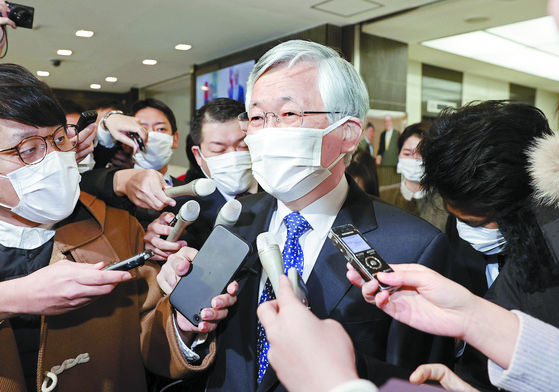Wave of judgment on compensation for comfort women
![Ambassador Nam Kwan-pyo to Japan answers questions from reporters after being invited to the Japanese Ministry of Foreign Affairs regarding the Korean court's decision to compensate grandmothers for comfort women on the 8th. [교도=연합뉴스]](https://i0.wp.com/pds.joins.com/news/component/joongang_sunday/202101/09/f25b3030-46ab-42dc-8c36-80fb6f2a0f84.jpg?w=560&ssl=1)
Ambassador Nam Kwan-pyo to Japan answers questions from reporters after being invited to the Japanese Ministry of Foreign Affairs regarding the Korean court’s decision to compensate grandmothers for comfort women on the 8th. [교도=연합뉴스]
The court ruling on the 8th that the Japanese government should compensate for the damages of comfort women means that justice has been realized for victims. Although Japan apologized for the damages of comfort women, it has rejected the concept of’compensation’ until the end. However, in the position of the South Korean government, which has to deal with the twisted relationship between Korea and Japan, another big homework has been encountered. Japan immediately protested against it, saying, “Korea has violated international law.”
Bigger Wave Than Private Enterprise Compensation Judgment
Shock in the transition situation of the ambassador change phase
Government is worried about less room for diplomatic solution
Suga “Violation of international law, lawsuit should be dismissed”
Kyodo News “Korea-Japan relations will become tough”
In this ruling, the court rejected the concept of “exemption from sovereignty” as used under international law. This is a norm that one country’s court cannot have jurisdiction over the sovereign acts of another country’s government. The court ruled that “the sovereign immunity theory is not intended to hide behind it and give an opportunity to evade compensation and compensation.” Yang Ki-ho, a professor at Sungkonghoe University, said, “We have lost all the lawsuits filed by the victims in Japan and the US courts, but this time it has been rescued in Korea.” Evaluated.
However, the fact that the defendant in this lawsuit is the Japanese government, not the private sector such as Japanese companies or individuals, also means that the impact on Korea-Japan relations is that much. Professor Park Chul-hee of Seoul National University Graduate School of International Studies said, “Unlike diplomacy, the judiciary has no room for negotiation or dialogue.” “No.”
Unfortunately, just before the ruling came out, the governments of Korea and Japan officially announced the appointment of Ambassador Kang Chang-il to Japan and Japanese Ambassador Aiboshi Koichi to Korea. The shock wave from the judiciary came shortly after the two countries expressed their willingness to change the state through exchange of ambassadors.

Graphic = Reporter Lee Jeong-kwon [email protected]
Perhaps because of this atmosphere, the Ministry of Foreign Affairs took the official position only 6 hours and 30 minutes after the decision was issued. “The government respects the judgment of the courts” and “remembers that the comfort women agreement between the governments of Korea and Japan is an official agreement between the two governments,” a deep concern of the government was buried.
The fact that Joe Biden’s US administration will be inaugurated on the 20th is also complicating the situation. On that day, the court judged that the victims’ right to claim damages did not lapse, and said, “This is not included in the agreement on the 2015 Japanese military comfort women victims issue.” At the time of 2015, the hidden party to the Korea-Japan comfort women agreement was the United States. In particular, the agreement at the time was a matter that former President Barack Obama was directly involved in. This means that President-elect Biden, who was then vice president, and candidate Tony Blincoln, who was deputy secretary of state at the time, are also familiar with the situation.
Professor Lee Won-deok of Kookmin University said, “The US was in a position to evaluate the Korea-Japan comfort women agreement, but with this ruling, we can think that’Korea is coming up with a problem again’.’ did.
The Japanese government also strongly protested, saying, “Never accept it.” He said it was a “uncommon judgment” that violated the principle of “exemption from sovereignty” used in international law. In particular, in Japan, the judgment was made against the Japanese government, not against a private company, so it is more sensitive than the 2018 judgment on compulsory conscription.
Japanese Prime Minister Yoshihide Suga also said at an interview that day, “I think this lawsuit should be dismissed under the principle that the sovereign state is not tried in other countries under international law.” Said. The Japanese Ministry of Foreign Affairs also invited Ambassador Nam Kwan-pyo to Japan as the Ministry of Foreign Affairs right after the ruling on the morning of the morning to deliver the protest. Japan’s Chief Cabinet Officer Kato Katsunobu also said at a regular press conference, “It is very regrettable that such a ruling came out.”
Kyodo News Agency said, “The relationship between Korea and Japan is expected to become even worse,” and “the shock exceeds the conscription lawsuit that ordered Japanese private companies to compensate.” The Yomiuri Shimbun also predicted that “the relationship between the two countries, which is called the’worst postwar’, will fall into a more crisis situation due to the problem of lawsuits for forced labor workers.” Hideki Okuzono, a professor at Shizuoka Prefectural University, said, “This ruling could worsen the anti-Korean sentiment of the Japanese public as well as those who claim that’Korea is a country where common sense doesn’t work.’
Reporters Yoo Ji-hye and Park Hyun-ju, Tokyo = correspondent Lee Young-hee and Yoon Seol-young [email protected]
